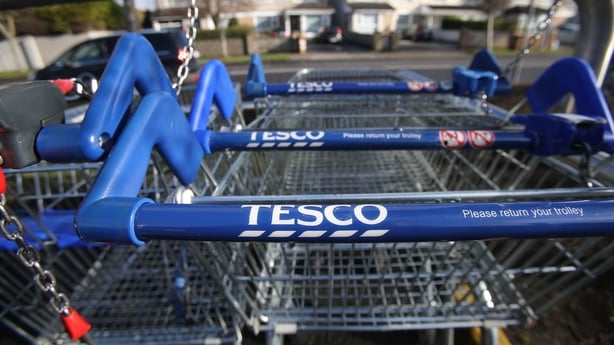Tesco had today forecast full-year profit would come in at the lower end of its previous guidance, citing uncertainty over how a worsening cost-of-living crisis will impact consumer spending.
The group said it now expects retail adjusted operating profit in the full year 2022-2023 of between £2.4 billion and £2.5 billion.
It had previously forecast £2.4 billion to £2.6 billion, down from the £2.65 billion made in 2021-22.
Confidence levels among Britain's consumers sank to a record low last month as they struggle with higher inflation, even before the government's mini-budget sowed turmoil in the mortgage market, leading to warnings of a sharp drop in house prices.
Wages are failing to keep pace with inflation, which was 9.9% in August. Consumers are buying less per shopping trip and trading down to cheaper own-label products.
"Significant uncertainties in the external environment still exist, most notably how consumer behaviour continues to evolve," it said.
Tesco did however upgrade its expectation for full-year retail free cash flow to at least £1.8 billion and forecast adjusted operating profit of £120-160m at Tesco Bank.
The group today reported first-half retail adjusted operating profit of £1.248 billion - down 10% from a pandemic-boosted £1.386 billion last year, and just below analysts' average forecast of £1.251 billion.
First-half group sales rose 3.1% to £28.178 billion, with UK like-for-like sales up 0.7%, having fallen 1.5% in the first quarter.
Tesco said its like-for-like sales in Ireland declined by 0.1% in the first half of its year, including a decline of 2.4% in the first quarter.
Tesco noted that the Covid-19 impact was particularly strong in Ireland with restrictions in place for a longer time than in other markets.
It said the effects of the Covid-19 unwind on volumes year-on-year eased in the second quarter and sales grew by 2.4%. This also reflected a gradual increase in inflation in the market, it added.
Natasha Adams, CEO of Tesco Ireland said she was very happy with the performance of the business during the first half of the year, despite ongoing market challenges.
"Our value proposition is resonating well - customers are responding to Aldi Price Match, Low Everyday Prices and Clubcard Prices across all categories," she said.
"As a business, we are acutely aware that the increased cost of living is placing a burden on many families, and our commitment to serving our customers and communities remains our number one priority.
"We continue to work collaboratively with suppliers and partners to ensure that we are supporting our customers in all that we do," she added.
In June, Tesco completed the acquisition of ten Joyce's stores in Co Galway, one of which it will sell as
a condition of the clearance of the transaction.

In April, Tesco and and UK rival Sainsbury's warned of a hit to profits this year as they plough cash into keeping prices competitive to deter customers from switching to German-owned discounters Aldi and Lidl, and face soaring energy and labour costs.
The pound's recent slump will further increase costs and squeeze already narrow margins.
Tesco's shares have fallen 28% so far this year, but most analysts still consider it best placed amongst Britain's major supermarket groups to navigate the downturn due to its huge buying power.
It is benefiting from the popularity of its 'Clubcard Prices' loyalty programme, a scheme to price-match Aldi on some products, and the unrivalled scale of its stores and online operations.
Monthly industry data has shown Tesco consistently outperforming its biggest rivals, Sainsbury's, Asda and Morrisons, on a sales value basis.
Last week Morrisons, the Co-operative and Aldi UK all reported profit falls, while clothing retailer Next warned on its outlook.
Tesco also joined rivals in raising pay for its UK store staff. The minimum hourly rate will rise 20 pence to £10.30 from November 13.

